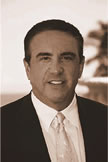|
 Home: PCU
4|2003: Editor's Note Home: PCU
4|2003: Editor's Note
 |
Editor’s Note
|
|
| The guy who
takes out the trash |
While audio is an effective, time-conserving media for continuing
medical education, there are situations when it fails to communicate
all that occurs during a one-on-one interview. For example, in
this issue, medical oncologist Dr Robert Dreicer presents a case
demonstrating the palliative benefits of chemotherapy in a patient
with metastatic prostate cancer. Frequently, the researchers we
interview present patients with unusual clinical courses or responses
to treatment, but the details of this case were not particularly
remarkable, and I wondered why this specific patient was being
presented.
Then, I began to notice Dr Dreicer’s eyes and facial expression
as he talked about the man, and it became obvious that there was
a great deal of caring between this doctor and his patient. When
I asked him about this, his voice broke and his eyes swelled with
tears. “He was one of those people that you just like — a ‘salt
of the earth kind of man.’ I’ve been an oncologist
for a long time, and I don’t develop relationships with every
patient. But there are certain people that you just connect with,
in terms of how they approach the world and go about their daily
business. He was one of those people I cared for a lot.”
Providing medical care to people with cancer is not a simple
occupation. For Dr Dreicer, the rewards of treating patients with
incurable cancers come from effective palliation. However, with
the benefits also come downsides, and Dr Dreicer notes that he
is not immune to the emotional toll of his work. For years, he
has struggled to find methods to cope with the tragedy that is
a daily part of oncology practice. “As I’ve gotten
a little older, I’ve spent a lot more time talking with my
wife and trying to do things to overcome some of the negative impact
of oncology. I don’t have a magical solution, but I try to
not bring work home with me. I’m still just the guy who has
to take out the trash and do all the other things, and I think
that’s worked pretty well for me. Some people do it by taking
three months of vacation a year; others by mountain biking. I don’t
know what the right answer is, but you do have to think about it.”
Another facial expression our listeners missed related to the
frustration expressed by Dr Leslie Schover, who believes that many
men are “sold a false bill of goods” in pretreatment
discussions about what to expect in terms of sexual function after
surgery and radiation therapy for prostate cancer. Her informal
clinical observations over many years of counseling men have been
that the rates of sexual dysfunction after primary local therapy
are far greater than the rates reported in medical literature.
In this program, Dr Schover reviews two groundbreaking papers she
reported in Cancer from a consecutive series of men treated at
the Cleveland Clinic.
With this center’s outstanding staff of urologists and
radiation oncologists, the incidence of post-therapy erectile dysfunction
was far greater than those documented in other series. Dr Schover
also notes that many prior studies with better results used suboptimal
methods to assess outcomes. In addition to providing more accurate
information to patients, she believes in a more structured approach
to post-therapy rehabilitation.
Dr Mack Roach was also visually expressive during our meeting,
particularly when he described a patient with locally advanced
disease he treated with conformal external-beam radiation therapy
and neoadjuvant and long-term androgen deprivation. A somewhat
bemused and perhaps triumphant smile crept across his face when
he described the “ups and downs” of a post-radiation
therapy PSA rise that initially suggested possible disease recurrence.
When an eight-core biopsy failed to demonstrate tumor recurrence,
Dr Roach patiently held off on any therapeutic intervention, and
the PSA has now remained stable for years. The patient is cancer-free
with normal erectile function, and it is easy to see that his follow-up
visits provide a great sense of satisfaction for both the patient
and physician.
One consistent observation I have made through many years of
face-to-face interviews with cancer researchers is that an aura
of humility seems to pervade these people’s personalities.
And more often than not, it seems that the most humble researchers
are those who have made the greatest contributions. Perhaps, it
is important for all of us to remember that we are still “the
guys who take out the trash” and that state-of-the-art cancer
medicine is only part of the complex, biopsychosocial formula required
to care for patients with this challenging disease.
— Neil Love, MD
E R R A T U M :
In Prostate Cancer Update, Volume 2, Issue 2, in reference to
the “Bolla” study*, an interviewee stated that LHRH
agonist treatment was started on the last day of irradiation. Dr
Warren Wilkins, InterCommunity Cancer Center, Illinois, contacted
us and pointed out that, in fact, patients in the combined treatment
group received goserelin every four weeks starting on the first
day of irradiation and continuing for three years.
*Bolla M et al. Improved survival in patients
with locally advanced prostate cancer treated with radiotherapy
and goserelin. N Engl J Med 1997;337(5):295-300.
|
|